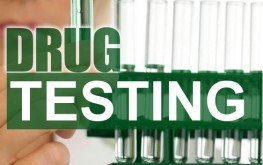Random Drug Testing Recommended for Elders, Children, Basically Everyone
Random Drug Testing Recommended for Elders, Children, Basically Everyone
( NaturalSociety ) Heated discussions arise anytime drug testing is brought up, and with good reason.

Robert Dupont, a former U.S. National Institute on Drug Abuse Director and “present day drug testing consultant and profiteer”, recently penned a white paperalong with input from various actors in the drug testing industry and under the American Society of Addiction Medicine (ASAM). In it, he recommends random drug testing become commonplace, not only for the safety of everyone, but to line his own pockets.
“This White Paper encourages wider and ‘smarter’ use of drug testing within the practice of medicine and, beyond that, broadly within American society. Smarter drug testing means increased use of random testing rather than the more common scheduled testing, and it means testing not only urine but also other matrices such as blood, oral fluid (saliva), hair, nails, sweat and breath.”
The ASAM paper calls on doctors ‘offices to begin random testing geriatric patients. After all, they reason, older Americans could be targeted by drug dealers using them to gain powerful prescriptions and keeping them hooked.
“Drug testing (in clinical settings) needs to become as common in medical practice as clinical diagnostic testing is in the management of hypertension and diabetes,” writes DuPont.
It also calls on parents to facilitate random testing in the home, because nothing builds a trusting parent-child relationship like blood draws and urine screenings…
Less shocking, but questionable nonetheless, the paper calls on increased workplace and school testing, and a greater use of drug testing at traffic stops.
Read: 12-Year-Olds Being Drug Tested in School
Aside from the obvious conflict of interest in ASAM’s recommendations—DuPont and those who signed off on the paper benefit greatly from the use of drug tests—the use, validity, and effects of random drug testing are questionable at best.
Why Drug Testing is Unnecessary
Drug tests are not always reliable. Tests for marijuana, for example, may register the presence of THC or its metabolite carboxy-THC for monthsafter a joint is smoked or cannabis edible is eaten—long after the psychoactive effects have dissipated. On the other extreme, some drugs are water soluble and can be completely undetectable in the urine after only 24 hours.
Even when the technology is sound and testing methods are reliable, human error and false positives are a problem. A 2012 report from the National Workrights Instituterevealed errors aren’t only possible but actually allowed in certified drug testing labs. Federal regulations, the report said, “allow labs to make mistakes on ten percent of blind samples used in the certification process.”
If the ASAM recommendations were based in actual facts and objective research, they would have come to the conclusion that random drug testing rarely has any large-scale positive outcome. A study released in the January issue of the Journal of Studies on Alcohol and Drugs revealed random drug testing programs in high schools did nothing to reduce the use of alcohol and drugs among students.
“Consistent with previous research, results of the current study show that perceived SDT (student drug testing) is not associated with a reduction in initiation or escalation of substance use in the general student population. The current research reinforces previous conclusions that SDT is a relatively ineffective drug-prevention policy.”
And all of this doesn’t even begin to address the privacy concerns of random drug tests. At what point is it okay for the government or corporations to infringe upon our rights and force us into drug tests? With alcohol detection, the effort to curb drunk driving has led to the near-acceptance of mandatory testing, where a refusal will garner a warrant and a forced blood draw, with nothing but the suspicion of an officer serving as probable cause.
Will doctor’s offices one day be able to test your blood for drugs when they test it for cholesterol or other general screenings? Will you be able to refuse them?
If the drug testing industry gets their way, drug tests may be required not only for food stamp recipients, students, employees, and drivers, but for everyone. The ASAM makes no bones about their goal. “(Our) principal goal in drug testing is for today’s impressive drug testing technology to be far more widely used.”
Other Popular Stories:
Get The NaturalSociety Natural Health Newsletter!
Post a Comment